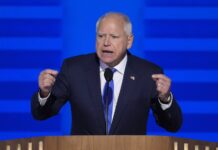Oksana Kishchuk and John Beebe find that Canadians who are lonely are significantly less certain they will cast a ballot in the next federal election.

Article content
Loneliness not only has serious consequences for our mental and physical health, it has consequences for the health of our democracy.
The pandemic accelerated long-term trends of feeling more and more isolated, fraying our social fabric and contributing to the “loneliness epidemic.” And this epidemic continues to erode the health of our democracy by reducing the opportunity for healthy dialogue and our desire to vote.
Advertisement 2
Article content
Canadians who report feeling lonely say they are much less likely to cast a ballot in the next election. Loneliness impacts voter intention as much as age — something that has long been a key predictor of whether or not people choose to vote.
Between 2013 and 2022, we saw a significant decline in people’s social networks. According to a recent report for the Community Foundations of Canada, during this period the number of Canadians reporting a strong network of close friends and family declined 11 and 14 per cent respectively. But most troubling, the number of people reporting a wider network of other friends and acquaintances declined from 79 per cent to 40 per cent. Our friend groups, especially groups of “loose friends,” expose us to new ideas. When those groups shrink, not only are we exposed to a narrower range of views on issues, we are also exposed to fewer people who encourage us to vote.
In some of our own research at Abacus Data, we found that Canadians were increasingly disconnected from both their own communities and society overall during the COVID-19 pandemic. The initial shock of the pandemic left many feeling disconnected from the wider world and society, and as the pandemic wore on, we found a sharp increase in the number of Canadians saying they felt disconnected “from everyone.” (In February 2021, 56 per cent of Canadians felt more disconnected from both their own community and society).
Advertisement 3
Article content
Back then, the feeling of disconnect was felt equally across all demographics.
More recently, we went back into the field to see whether Canadians are still feeling lonely. Overall, fewer Canadians are feeling lonely, but there are other concerns. In April 2024, we found one-third of Canadians say they are lonely, but this jumps to half of Canadians 18 to 29. We also found younger Canadians are also far less likely to be satisfied with their friendships.
These findings are concerning, not only for mental health but for the consequences this brings for our democracy. In some of our other research, we find that duty to society/community is one of the biggest drivers for casting a ballot, and without it, there is less motivation to participate in democracy.
In the same yet-to-be-released survey from April 2024, we find that Canadians who are lonely are significantly less certain they will vote in the next federal election (a 14-point difference).
Given the prevalence of loneliness among younger Canadians, this is a concerning finding about the future of democracy.
Advertisement 4
Article content
This data helps explain one reason for the recent dramatic declines in voter turnout in federal, provincial and municipal elections. Participation in federal elections by young people (18-to-24) dropped from 57.1 per cent in 2015 to 46.7 per cent in 2021. Many recent provincial and municipal elections have had the lowest turnout in history. While increasing loneliness is not the only cause of these declines, it does point to potential solutions.
By addressing the root causes of the loneliness epidemic, we can improve the health of our democracy. This will take a multi-sector approach and include public policy decisions on regulating social media platforms, the use of smartphones in schools and support for public institutions such as libraries and community centres that bring us together. It will also require our philanthropic community to invest in recreational and cultural programs that bring communities together through fun and engaging activities. These are areas not often associated with a healthy democracy, but they are as essential to our democratic health as trees are to the health of the air we breathe.
Advertisement 5
Article content
And it requires all of us to break the barriers of loneliness by reaching out and engaging our friends, neighbours and colleagues by listening to their aspirations and concerns, even when we don’t agree. It is these conversations that help us engage across differences and build a healthy democracy.
Oksana Kishchuk is Director, Strategy & Insights, at Abacus Data, a market and public opinion research firm. John Beebe is the founder of the Democratic Engagement Exchange at Toronto Metropolitan University.
Recommended from Editorial
Article content




